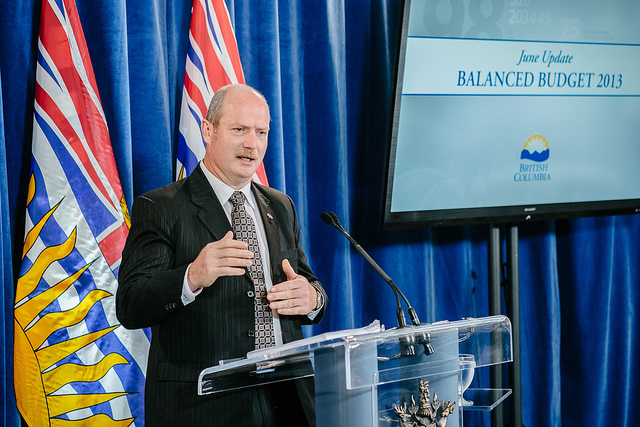One can only presume that the promise of a debt-free B.C. was never meant to be taken seriously.
Christy Clark’s very cynical, albeit effective election slogan was based on two highly qualified guestimates of the potential taxes that could be generated in the most optimistic possible circumstances from an industry that does not yet exist. Thus it comes as no surprise, as Vaughn Palmer pointed out in a recent column, that the latest provincial financial reports show us moving further into debt with no prospect of anything close to what was promised.
The issue, however, is not whether the promise of a debt-free B.C. will be achieved. It won’t, at least not in my lifetime. The issue is whether it was ever a reasonable policy objective in the first place. After all, debt supports investments and long-term assets, as Palmer pointed out in his curiously soft, almost apologetic commentary. If no debt means no investment in needed assets we will be making future generations worse, not better off.
I recall when Mike Harcourt was elected, the mainstream media (with Palmer at the forefront) railed against increasing government debt, with virtually no regard to the investments and assets it enabled. That anti-debt campaign had two unfortunate consequences. It caused government to cut back on capital expenditures, however needed and valuable they might be. And it encouraged government to look to “innovative” off-book financing in order to reduce the reported amount of public debt. The political need to hide debt led directly to the widespread use of P3s even if that increased, through long-term contractual obligations, the liability future British Columbians would ultimately have to pay for.
Individuals and households can reduce and possibly eliminate their debt. They can, for example, sell their homes and rid themselves of the mortgages that come with it. But that doesn’t make them better off. What makes them better off is responsibly making the investments they need and that provide benefits in excess of the costs.
So it is with government. We can reduce debt by selling assets, leasing instead of buying and postponing or simply failing to make investments that are required and beneficial, but that doesn’t make us better off.
The sensible public policy is to be guided by a principle of leaving future generations better off. And that is very unlikely to mean without debt. It means ensuring that needed and valuable investments are made in the most efficient and cost-effective manner, so that the value of the human as well as physical capital we leave behind exceeds the cost of the debt that goes with it.
The real policy problem in this province is not that we are failing to move to a debt-free B.C. The policy problem is that we are incurring debt for things we don’t need, that arguably don’t offer benefits in excess of their cost or at best are low in priority relative to other pressing demands (think Cadillac upgrade to the Sea-to-Sky highway, Smart Meters, the NW Transmission line and the retractable roof over BC Place). And at the same time we are failing to make the ones we should, for example in early education and high-quality child care, flood control and other preparation for extreme climate events, and a host of other areas.
I agree with those who say we need more oversight and vigilence in what we do and how we do it. We shouldn’t impose unnecessary or unjustified costs on future generations. But costs are imposed by what we fail to do as much as what we do. The pursuit of a debt-free B.C. would be a lot more costly for future generations than a more sensible and balanced policy.
Photo: BC Gov Photos/flickr



